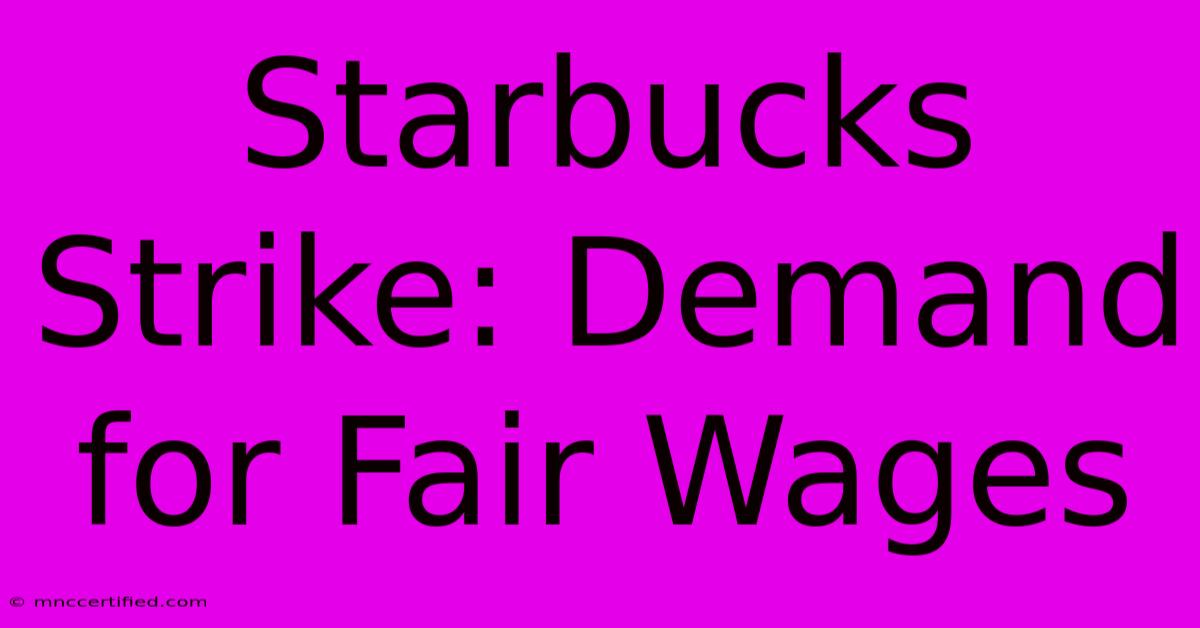Starbucks Strike: Demand For Fair Wages

Table of Contents
Starbucks Strike: Baristas Fight for Fair Wages and Better Working Conditions
The aroma of freshly brewed coffee is often associated with Starbucks, but recently, a different scent has permeated the air: the scent of rebellion. Baristas across the country are staging strikes, demanding fair wages, improved working conditions, and union recognition. This widespread labor action highlights a growing movement within the service industry, fighting for better treatment and economic justice. This article delves into the reasons behind the Starbucks strikes, the demands of the workers, and the broader implications for the industry and the economy.
Why Are Starbucks Workers Striking?
The Starbucks strikes aren't simply about a pay raise; they represent a culmination of long-standing grievances. Workers cite several key issues driving their actions:
-
Insufficient Wages: Many baristas argue that their current wages are insufficient to meet the rising cost of living. Inflation has significantly impacted their purchasing power, making it difficult to afford basic necessities. This struggle is particularly acute in high-cost areas where Starbucks locations are often concentrated. The demand for living wages is central to the strike.
-
Inadequate Benefits: Beyond wages, concerns about healthcare, retirement plans, and paid time off are significant factors. Workers are seeking improvements in these areas to enhance their overall well-being and financial security. The lack of comprehensive employee benefits is fueling the discontent.
-
Unsafe Working Conditions: Understaffing and demanding workloads are leading to stressful and sometimes unsafe working conditions. Baristas report feeling overworked and overwhelmed, impacting both their physical and mental health. Calls for safer working environments are a key element of the strike.
-
Union Busting Allegations: Starbucks has faced accusations of actively trying to prevent unionization efforts. Workers allege unfair labor practices, intimidation, and retaliatory actions against those involved in union activities. The fight for union recognition is therefore intertwined with the broader struggle for improved working conditions.
-
Lack of Respect and Appreciation: Many baristas feel undervalued and disrespected by management. This lack of appreciation contributes to a negative work environment and fuels the desire for greater worker empowerment. The strikes represent a demand for respect and dignity in the workplace.
What are the Workers Demanding?
The demands of striking Starbucks workers are multifaceted but largely center around these core issues:
-
Significant Wage Increases: Workers are pushing for wage increases that reflect the rising cost of living and the demanding nature of their jobs. This includes advocating for $15-$25 per hour depending on location and experience.
-
Improved Benefits Packages: This includes better healthcare coverage, enhanced retirement plans, and increased paid time off. The focus is on creating a more comprehensive and supportive benefits package for all employees.
-
Safe Staffing Levels: Workers are demanding adequate staffing to reduce workloads and create safer working conditions. This addresses the issue of overwork and burnout prevalent among baristas.
-
Protection from Retaliation: Workers are seeking guarantees that they will not face retaliation for engaging in union activities or speaking out about working conditions. This involves a demand for fair and unbiased treatment from management.
-
Union Recognition: A central demand is for Starbucks to voluntarily recognize and bargain with the workers' unions. This is crucial for ensuring that the workers' voices are heard and that their concerns are addressed effectively.
The Broader Implications of the Starbucks Strikes
The Starbucks strikes are not isolated incidents. They represent a broader trend of workers across various industries demanding better wages, benefits, and working conditions. The outcome of these strikes will have significant implications for:
-
The Service Industry: The success of the Starbucks strikes could inspire similar actions in other service-industry companies, potentially leading to widespread changes in wages and working conditions.
-
The Labor Movement: The strikes demonstrate the growing power of organized labor and the potential for collective action to effect positive change.
-
Corporate Responsibility: The strikes raise important questions about corporate responsibility and the treatment of workers. They highlight the need for companies to prioritize fair labor practices and invest in their employees' well-being.
The Starbucks strike is a significant event with potentially far-reaching consequences. The outcome will shape not only the future of Starbucks but also the broader labor landscape, influencing how companies treat their workers and the ongoing struggle for economic justice. The fight for fair wages and better working conditions is far from over, and the actions of Starbucks workers are setting a powerful precedent.

Thank you for visiting our website wich cover about Starbucks Strike: Demand For Fair Wages. We hope the information provided has been useful to you. Feel free to contact us if you have any questions or need further assistance. See you next time and dont miss to bookmark.
Featured Posts
-
Pittsburgh Chiefs Game Taylor Swift Present
Dec 26, 2024
-
38m Motor Yacht Butterfly For Sale
Dec 26, 2024
-
Kazakhstan Crash Azerbaijan Airlines 38 Dead
Dec 26, 2024
-
Elton John Performs Tiny Dancer Disney Christmas
Dec 26, 2024
-
Tayce Strictly Christmas Contestant
Dec 26, 2024